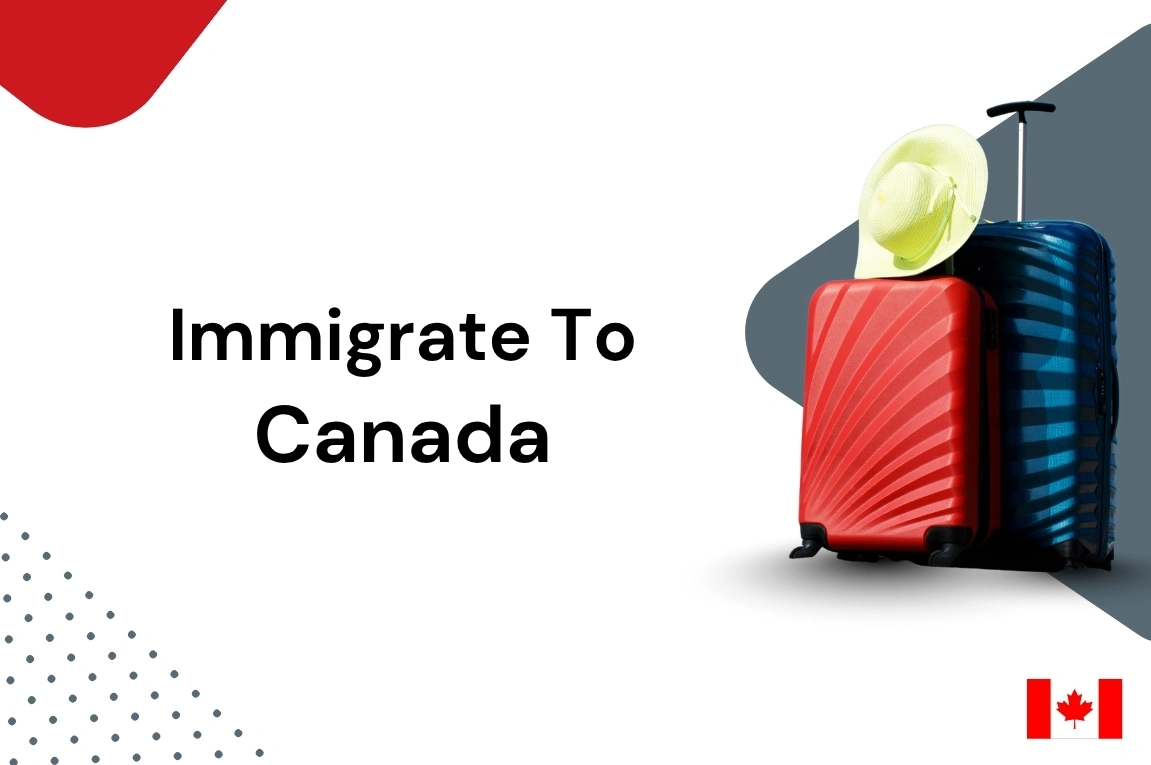Thinking About Immigrating to Canada? Let’s Explore It.
Last year, more than 483,000 people chose Canada as their new home. They came from all over the world, searching for peace, opportunity, and a brighter future for their families.
Maybe you’re thinking about doing the same. And if you are, you’re not alone. Taking the first step toward immigrating to Canada can feel overwhelming, with forms, rules, and so many programs. But guess what? You don’t have to figure it all out on your own.
We’re here to help, with the guidance of a licensed immigration lawyer approved by IRCC. Whether you’re planning to work, study, or bring your family, we’ll walk you through the journey step by step.


Why Do So Many People Choose Canada?
Ever wonder what makes Canada so appealing? Here are four reasons why thousands of people choose to start fresh here every year:

Healthcare That Doesn’t Break the Bank
Healthcare in Canada is publicly funded. That means basic medical care is free for everyone. No surprise bills, no fear of going to the hospital.
“When my daughter needed surgery, we paid nothing. That’s when I knew I made the right choice.” | Amal, mother of two, from Lebanon

Safe and Peaceful Environment
Canada is one of the safest countries in the world. Streets are clean, laws are fair, and communities are welcoming.
Imagine sending your kids to school or walking home at night without fear. That’s everyday life in many parts of Canada.

Real Jobs for Real Skills
Are you a skilled worker looking for better opportunities?
Canada needs people like you. Whether you’re in healthcare, IT, construction, or transportation, there’s demand for your skills.
“I was a mechanic in my country. Now I work in Alberta and support my family.” | Hassan, from Morocco

Good Life for Families
Canada supports families. Public schools are free, and there are plenty of parks, libraries, and safe places for kids to grow.
Want your children to have more opportunities? You’re in the right place.
Which Immigration Path Is Right for You?
Canada offers different programs depending on your background and goals. Here’s a quick look at the most common ones:
Start-up Visa
Turn Your Business Dream Into Reality
This program is for entrepreneurs with innovative ideas. Your idea must create jobs and be supported by a Canadian business group.
What you’ll need:
- A strong, innovative business idea
- Support letter from an incubator or investor
- CLB 5 in English or French
- Proof of funds to live in Canada
Express Entry
For Skilled Workers
If you have work experience, education, and language skills, Express Entry might be your best route. You create a profile and receive a score; the higher, the better your chances of getting invited.
Basic requirements:
- IELTS or equivalent language test
- At least 1 year of skilled work experience
- Education credential
- Proof of funds (unless you’re already in Canada)
Family Sponsorship
Reunite With Loved Ones
Do you have close family in Canada? They might be able to sponsor you.
The sponsor must:
- Be at least 18 and live in Canada
- Have enough money to support you
You’ll need documents proving your relationship (like a marriage or birth certificate).
Business Immigration
Invest or Work for Yourself
If you have business experience and want to invest or be self-employed in Canada, this might be the path for you.
Requirements include:
- At least 2 years of business experience
- A solid business plan or investment
- Language skills (CLB 5 or higher)
Study
Study and Stay
Dreaming of studying at a Canadian university or college? Here’s what you need:
- A letter of acceptance from a Designated Learning Institution (DLI)
- Proof you can cover tuition and living expenses
- Language test results (such as IELTS)
And the best part? After graduation, you might qualify to stay and work in Canada — turning your education into a new beginning!
Quebec Immigration
A Unique Path
Planning to settle in Quebec? Their process is separate from the rest of Canada.
You’ll need:
- Strong French (often required)
- Work and education history
- CSQ (Quebec’s approval before federal application)
Caregiver Programs
Help Others, Build Your Future
If you have experience caring for children or seniors, Canada offers programs that may lead to permanent residence.
To qualify, you need:
- A job offer
- 1 year of experience as a caregiver
- High school education
- CLB 5 language score
Atlantic Immigration Program
Build a Life by the Sea
For those with job offers in Nova Scotia, New Brunswick, PEI, or Newfoundland and Labrador.
What you’ll need:
- A job offer from an approved employer
- Language score (CLB 4+)
- Education and proof of funds
Rural and Northen immigration Program (RNIP)
Do you prefer small towns? The Rural and Northern Immigration Pilot lets skilled workers settle in specific communities.
Basic requirements:
- Job offer in a participating town
- Language test (CLB 4–6)
- Education and work experience
Agri-Food Pilot
Work in Farming and Food
Already working in meat production or agriculture in Canada?
You may qualify if you have:
- 1 year of full-time experience in an eligible job
- CLB 4 language score
- Job offer (non-seasonal)
Self-Employed and Entrepreneur Streams
Artists, athletes, and business owners with a plan to live and work independently in Canada can apply through these streams.
You’ll need:
- 2+ years self-employment experience
- A plan to contribute to Canadian culture or economy
- CLB 5 or higher
Refugees
If you’re facing danger, war, or persecution, Canada offers protection through its refugee programs.
You can apply:
- From abroad (through UN or sponsorship)
- Inside Canada (refugee claim process)
You must show a real fear of harm and pass a hearing, medical, and security check.
Moving to Canada Requirements
These documents are needed for most immigration programs:
- Valid passport
- Language test result (like IELTS for English or TEF for French)
- Education documents (diplomas or degrees)
- ECA (Educational Credential Assessment – shows your degree is equal to the Canadian level)
- Work experience letter
- Police certificate (to show you have no criminal record)
- Medical exam (from a doctor approved by Canada)
- Proof of money (a bank letter to show you can live in Canada)
- Photos (passport-size, for your application)
Now let’s look at the main immigration pathways and their special requirements.
Express Entry (Federal Skilled Worker)
- Language test (minimum CLB 7 = IELTS 6 in all skills)
- ECA for education
- At least 1 year of full-time work experience
- Proof of funds (about $13,757 CAD for 1 person)
- Minimum 67 points out of 100 (selection grid)
- Good CRS score (usually 470+ to get an invitation)
Provincial Nominee Program (PNP)
- All Express Entry documents
- A nomination certificate from a province
- Some PNPs need a job offer, some do not
- Language test (minimum depending on the job type)
Family Sponsorship
- The sponsor must be a Canadian citizen or permanent resident
- The sponsor must show they have enough income
- Proof of relationship (like a marriage or birth certificate)
- No proof of funds needed from the person coming
Student Visa (Study Permit)
- Letter of Acceptance (LOA) from a Canadian school
- Proof of money (tuition + living expenses = at least $20,000 CAD per year)
- Letter of explanation (why you want to study)
- Some schools ask for a language test
Work Permit
- Valid job offer
- Some jobs need an LMIA (a paper from the government)
- Work contract
- Medical exam for health-related jobs
- No need for proof of funds in most cases
Start-up Visa
- Support letter from a Canadian investor
- Business plan
- CLB 5 in English or French
- Proof of money (same as Express Entry)
Atlantic Immigration Program (AIP)
- Job offer from an approved employer in Atlantic Canada
- Language test (CLB 4 or higher)
- High school diploma or higher
- Proof of money (same as Express Entry)
Sugimotovisa, Your Trusted Partner for Immigration to Canada 🤝
Thinking about moving to Canada but not sure where to begin? That’s exactly why we’re here. At Sugimotovisa, we’ve been guiding people just like you through the Canadian immigration process for over 5 years. Led by Mr. Hamed Sugimoto, a licensed immigration lawyer recognized by the Government of Canada, our team understands how overwhelming this journey can feel.
With offices in Vancouver, Toronto, and Tehran, we’ve supported over 20,000 clients, and with a 98% satisfaction rate, our results speak for themselves. Whether you’re applying as a student, worker, or planning to move your whole family, we’ll walk beside you every step of the way.
Wondering what’s possible for your case? Let’s find out together. Fill out our free assessment form and take the first confident step toward your future in Canada.


